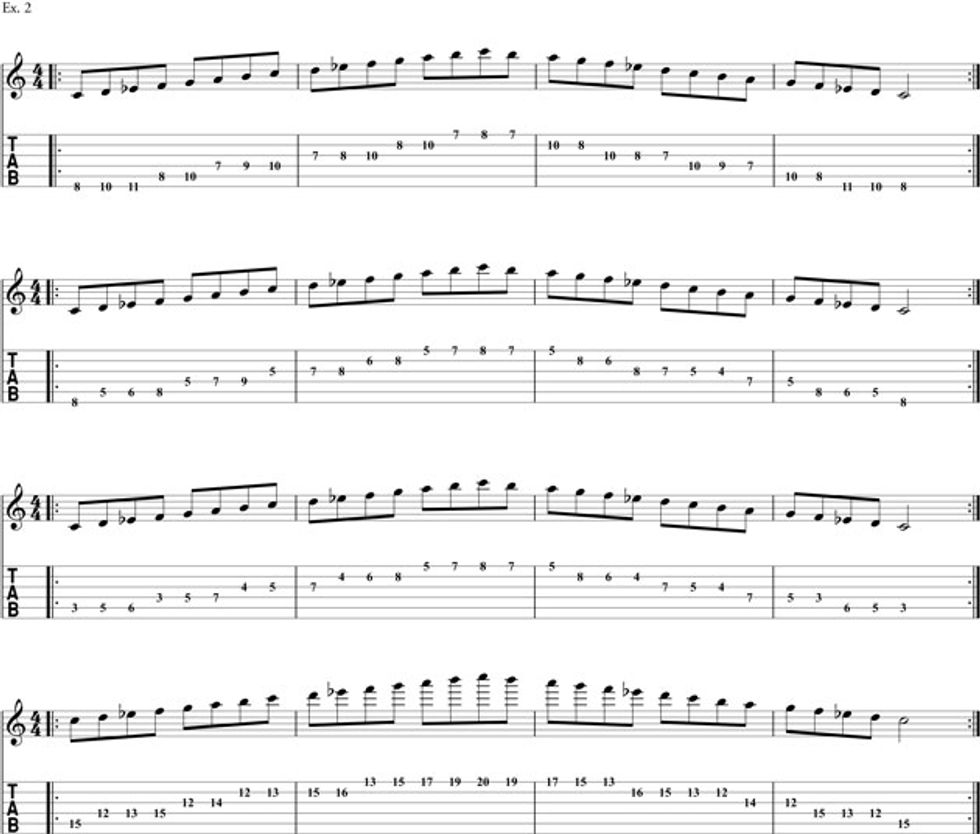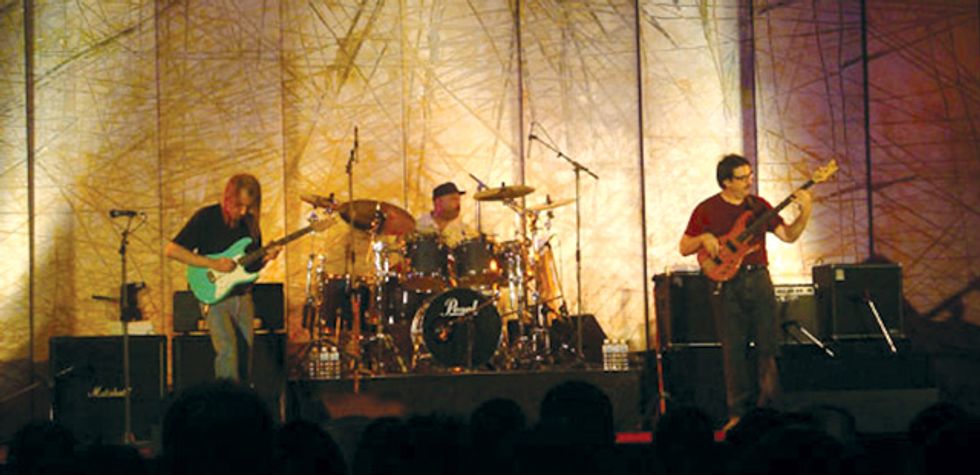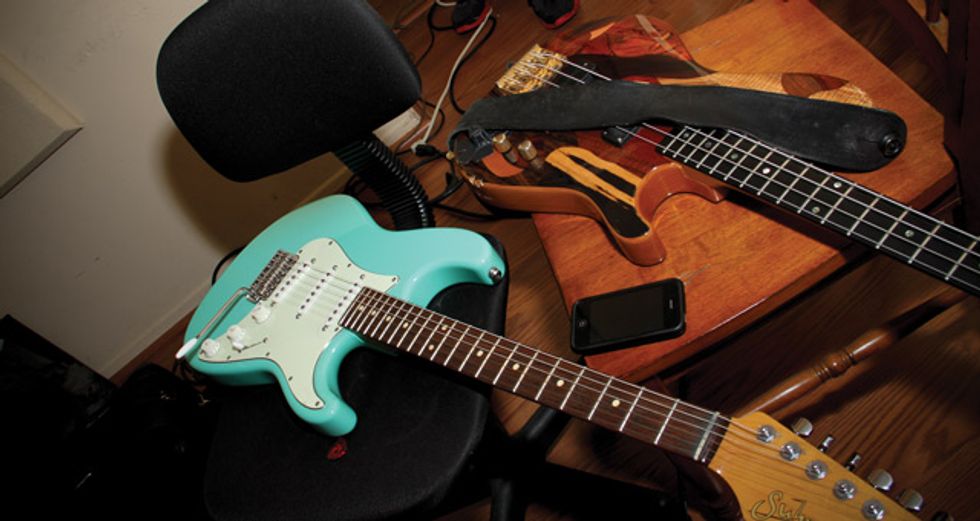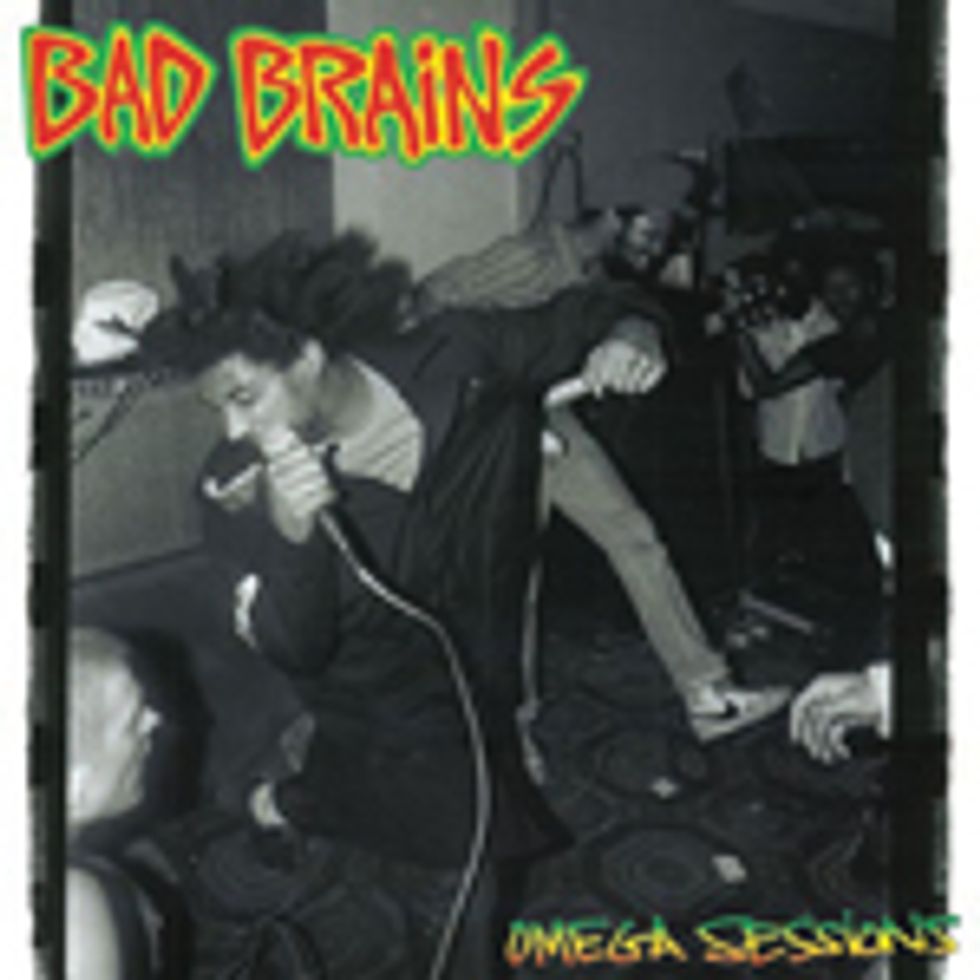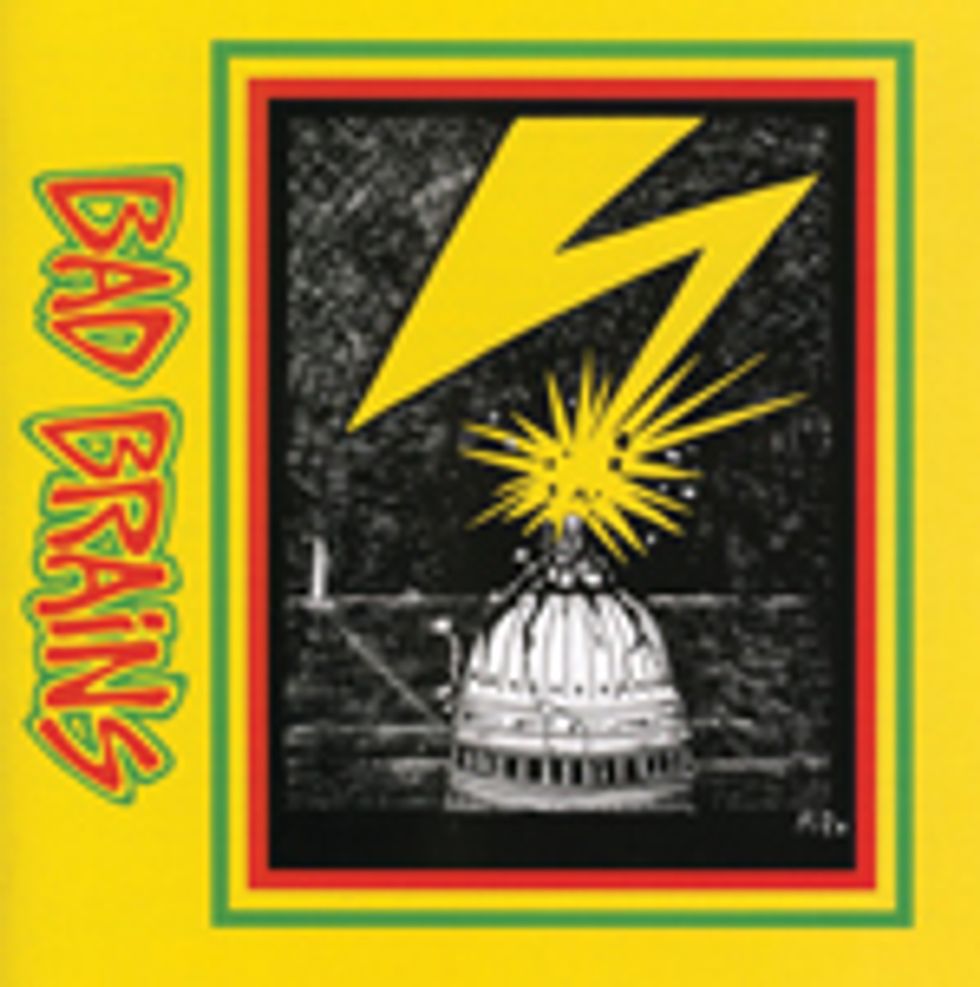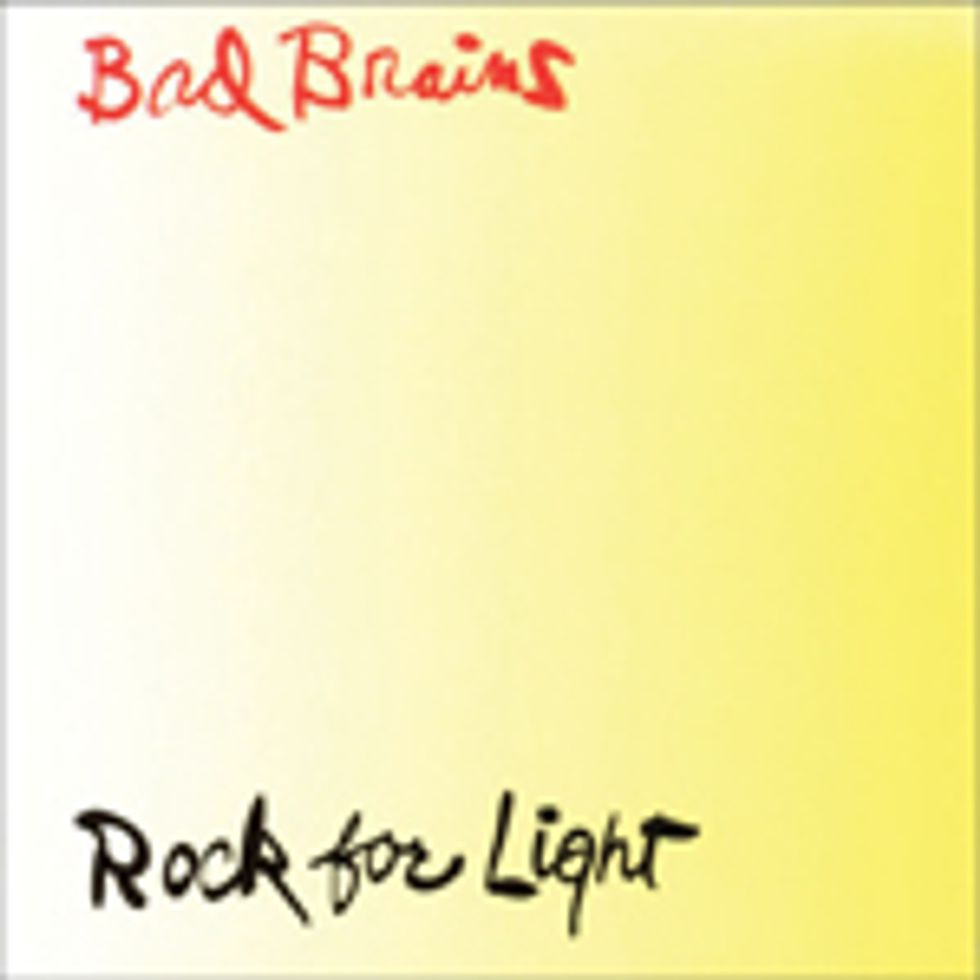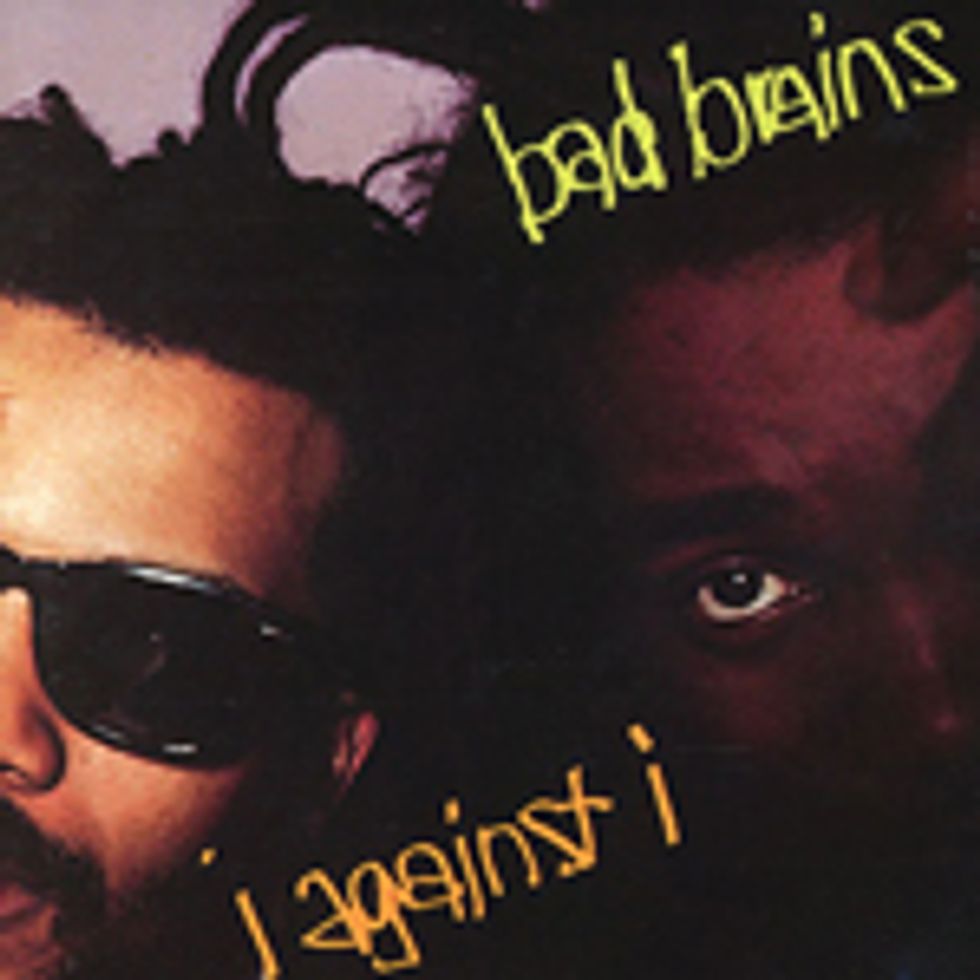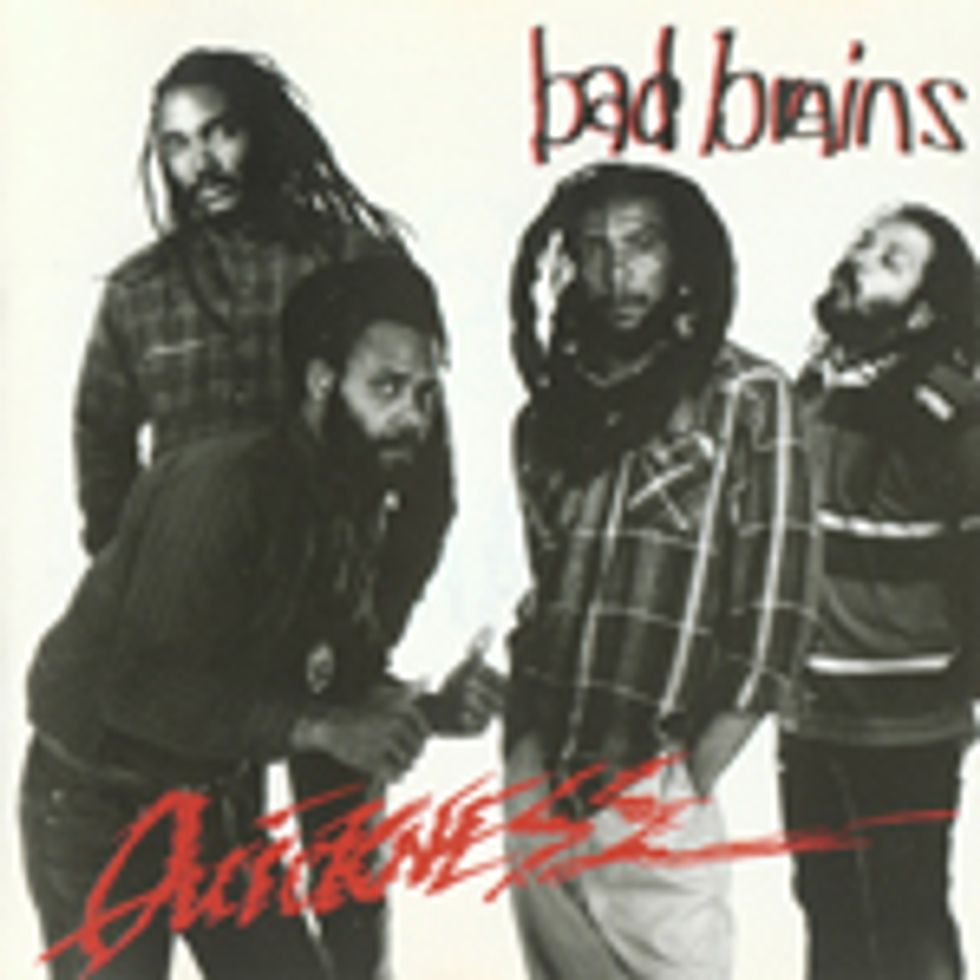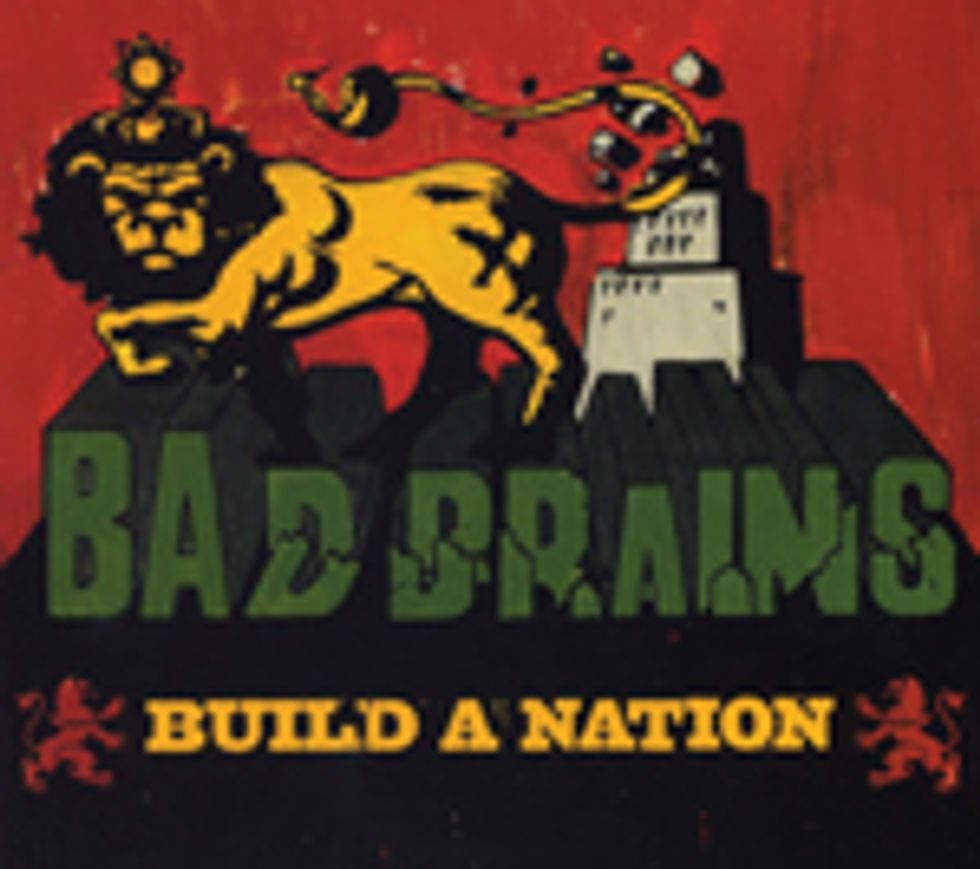Find out why this pattern favored by metal shredders and jazz gurus is one of the most accurately named modes.
Chops: Intermediate Theory: Advanced Lesson Overview: • Learn about the entire harmonic universe of the melodic minor scale. • Understand how to match the different modes to the appropriate chords. • Develop a deeper understanding of altered dominants. Click here to download a printable PDF of this lesson's notation. |
It's interesting how scales develop their names. In particular, what makes Super Locrian super? I'm sure there are a whole host of reasons/theories surrounding that one, but let's save that for another time. Today I want to focus on a different scale that somehow has earned the most admirable of adjectives—the melodic minor scale. The name might lead one to believe that this particular group of notes is the only way to be “melodic" on your instrument. Can we all agree that isn't the case? Cool. Let's move on.
The ascending melodic minor scale is one of the three traditional minor scales. It is constructed with a W–H–W–W–W–W sequence of whole-steps (W) and half-steps (H). In the key of C that would give us C–D–Eb–F–G–A–B or 1–2–b3–4–5–6–7 as shown in Ex. 1. Other ways to wrap you brain around it could be a simple major scale with a b3 or natural minor with raised 6 and 7 scale degrees.
It has a bright sound due to the four consecutive whole-steps in the top half of the scale and is used primarily in jazz to create altered dominant seventh chords and modes that you can't get from the major scale system. Ex. 2 provides you with four common two-octave melodic minor scale patterns. This is an easy way to get the sound of the scale under your fingers and in your ears.
After learning how a scale is built, the next step is to dig into the diatonic thirds, triads, and seventh chords it creates. The better your understanding of the harmony of the scale, the easier it will be to compose and improvise with it. Essentially, figure out what's there, and then figure out how you're going to use it.
In Ex. 3, I've systematically mapped out all the diatonic thirds across five different adjacent string sets. I jumped down the octave when needed, but playing through these will help give you a more horizontal view of the scale. Check out that run of major thirds in the middle—that is the sound of the jazz melodic minor.
Click here for Ex. 3
Next up are the diatonic triads (Ex. 4). This linear view of the triads helps me see how each one is related to one another. The resulting harmonic pattern is Cm–Dm–Ebaug–F–G–Adim–Bdim. Playing through these triads a few times will also help outline the brightness of the scale.
Click here for Ex. 4
What's next? Why, seventh chords of course! In Ex. 5, I wrote out voicings for the chords with roots on the 5th and 6th strings. Here, the harmonic pattern is a bit more complicated: Cm(maj7)–Dm7–Ebmaj7(#5)–F7–G7–Am7b5–Bm7b5. If you haven't seen a m(maj7) chord before, it's simply a minor triad with a natural 7 on top.
Click here for Ex. 5
The previous examples show these dyads and chords lined up and down the neck. You can obviously play the notes together or separately using different rhythms and string patterns. In Ex. 6, Ex. 7, and Ex. 8 I've outlined a few different practice patterns for this scale. I didn't do all the work for you, but I think you will get the gist of it pretty quickly. Over the years I've worked on playing these structures as ascending, descending, and alternating between the two. Obviously, there are other intervals and chord structures that you could work on (and you should), but because most jazz harmony is built by stacking thirds, this is a good place to start. Practicing in this way increase your technical ability, and you'll have something ready to play if you're not inspired by anything else at the moment.
Click here for Ex. 6
Click here for Ex. 7
Click here for Ex. 8
Now, let's dive into the modes of the jazz melodic minor scale. In Ex. 9, I've written out a fingering for each one of the diatonic modes and below I've written out their corresponding formulas.
- C melodic minor 1–2–b3–4–5–6–7
- D Dorian b2 1–b2–b3–4–5–6–b7
- Eb Lydian augmented 1–2–3–#4–#5–6–7
- F Lydian dominant 1–2–3–#4–5–6–b7
- G Mixolydian b6 1–2–3–4–5–b6–b7
- A Locrian #2 1–2–b3–4–b5–b6–b7
- B Super Locrian 1–b2–b3–b4–b5–b6–b7
Click here for Ex. 9
Suppose you need to find the parent key of A Lydian dominant. Simply find the melodic minor scale that has an A as the fourth note. Spoiler: It's E melodic minor. In Ex. 10, each mode of the jazz melodic minor scale is played in order starting on C. Playing them from the same root allows you to actually hear how different each mode sounds. When played diatonically, it's easy to miss their individual characteristics. Memorizing the order of the modes will help you find the parent key of any single melodic minor mode.
Click here for Ex. 10
The next step, of course, is figuring out how and where to use these modes. You have to think about chord type and chord function, just like the modes of any other scale. The melodic minor scale can be used over any min(maj7), m6, or any chord that functions as the tonic in a minor key. That means if you're playing a blues in C minor, you can use the C melodic minor scale. Check out Ex. 11 to hear what this mode sounds like over a simple Im–V progression in C minor.
Click here for Ex. 11
The second mode, Dorian b2 can be used over a IIm7 chord. It's a darker sound compared to the Dorian mode due to the b2. In Ex. 12, I'm playing the A Dorian b2 (G melodic minor) over an Am13 vamp, focusing on triads and thirds to bring to the 13th and b2 sound of the mode.
Click here for Ex. 12
If the Lydian mode is bright enough for you, then get into the Lydian augmented scale, the third mode of melodic minor. Ex. 13 uses the E Lydian Augmented (C# melodic minor) over a G#/E to F#/E vamp. I'm still utilizing thirds and triads to get the sound of the mode, but also targeting chord tones of Emaj7(#5).
Click here for Ex. 13
Jumping ahead to Locrian #2, this mode is used over m7(b5) chords to get a slightly brighter half-diminished sound with a little more tension. Ex. 14 uses the F# Locrian #2 mode (A melodic minor) over an F#m7(b5) vamp, exploring the #2 sound in a couple different positions.
Click here for Ex. 14
The next three examples explore dominant seventh sounds and each example is over a IIm7–V–I–VIm progression in D major. First up is Lydian dominant in Ex. 15. When confronted with a 7(#11) chord, this is the mode to use. It's almost identical to Mixolydian, but with a raised fourth scale degree. Over the V chord, I'm playing A Lydian dominant (E melodic minor), and B Lydian dominant (F# melodic minor) over the VI chord.
Click here for Ex. 15
In Ex. 16 we dive into Mixolydian b6. Again, it's almost identical to Mixolydian but with a flatted 6th scale degree. Over the V chord I'm playing A Mixolydian b6 (D melodic minor) and over the VI I'm using B Mixolydian b6 (E melodic minor).
Click here for Ex. 16
Last but not least is Super Locrian. Even though this mode builds a m7(b5) chord, it is often used over a dominant chord to get all the altered tones (b9, #9, b5, #5), hence the “altered scale" name. It's also known as the diminished whole tone scale because it begins like a half-whole diminished scale and ends with whole tones. In Ex. 17, I'm playing A Super Locrian (Bb Melodic Minor) over the V chord and B Super Locrian (C Melodic Minor) over the VI chord.
Click here for Ex. 17
The jazz melodic minor scale can be used over all the seventh chords found in the major scale system. It will add new color tones and tension to your soloing and chord voicings. You could potentially substitute a mode of the jazz melodic minor over every seventh chord in a jazz standard and create an alternate diatonic universe. Obviously, that would eat up a lot of clock time in your weekly schedule, but in the meantime, you can add these new flavors to your favorite lines and come up with a brand new you. Enjoy!
Musicians Institute guitar guru Scott Henderson and outspoken bass virtuoso Jeff Berlin discuss their chops-laden new album with Dennis Chambers, why Berlin didn’t join Van Halen, and why metronomes and rock academia are useless.
Jazz super-trio HBC—Scott Henderson, Dennis Chambers, and Jeff Berlin— at a gig in Israel.
It began about three decades ago at Hollywood’s Musicians Institute [formerly Guitar Institute of Technology], when (then) guitar student Scott Henderson walked into jazz-fusion bass instructor Jeff Berlin’s office and said, “You should hire me.”
The infamously outspoken Berlin (who says of a reported past offer to join Van Halen, “They were rock royalty and I didn’t wish to take the gig for mercenary reasons. But I should be in the band now—I would be the best bass player they ever had. I would lift them 40 percent higher than they are now”) decided to go to one of Henderson’s Top 40-cover-band gigs. Berlin came away so impressed that he hired Henderson to play on Champion, his first solo record. It was the start of a musical relationship that lasted until Berlin moved to Florida in the mid ’90s to open the Players School of Music.
But if you’re thinking the difficult-to-impress bassist—whose prestigious gigs over the years include stints with Frank Zappa, Allan Holdsworth, Sonny Rollins, k.d. lang, Kazumi Watanabe, T Lavitz (Dixie Dregs), and Anderson Bruford Wakeman Howe—was won over by note-for-note renditions of “Cocaine,” think again. Henderson used those gigs to show off the burning intervallic and chromatic lines that have made him a legend among fusion guitar geeks worldwide.
“I think I soloed more on some of my Top 40 gigs than I do on some of my band’s gigs today,” laughs Henderson—whose own list of accomplishments is as impressive as Berlin’s. Since graduating from MI, he’s worked with jazz gods Chick Corea (Miles Davis, Return to Forever) and Joe Zawinul (Weather Report), as well as renowned violinist Jean Luc-Ponty (Mahavishnu Orchestra). “All a club owner cares about is whether the people are dancing. Once you have the floor packed, you can play anything you want—people are drunk and nobody cares. I played 20-minute solos, just practicing the stuff that I learned at school.” Soon after leaving the ranks of MI’s students, Henderson joined its faculty, where he still holds a teaching position to this day.
Since opening the Players School, Berlin has been on hiatus from major touring. But in 2009, he got the gigging bug again and called up Henderson. “Scott and I are, frankly, made for each other,” says Berlin. Monster drummer Dennis Chambers (Parliament-Funkadelic, John Scofield, Santana) was also enlisted for the tour, and the trio recently released HBC—an album that borrows heavily from the Weather Report catalog to relentlessly showcase the members’ smoldering improvisational prowess.
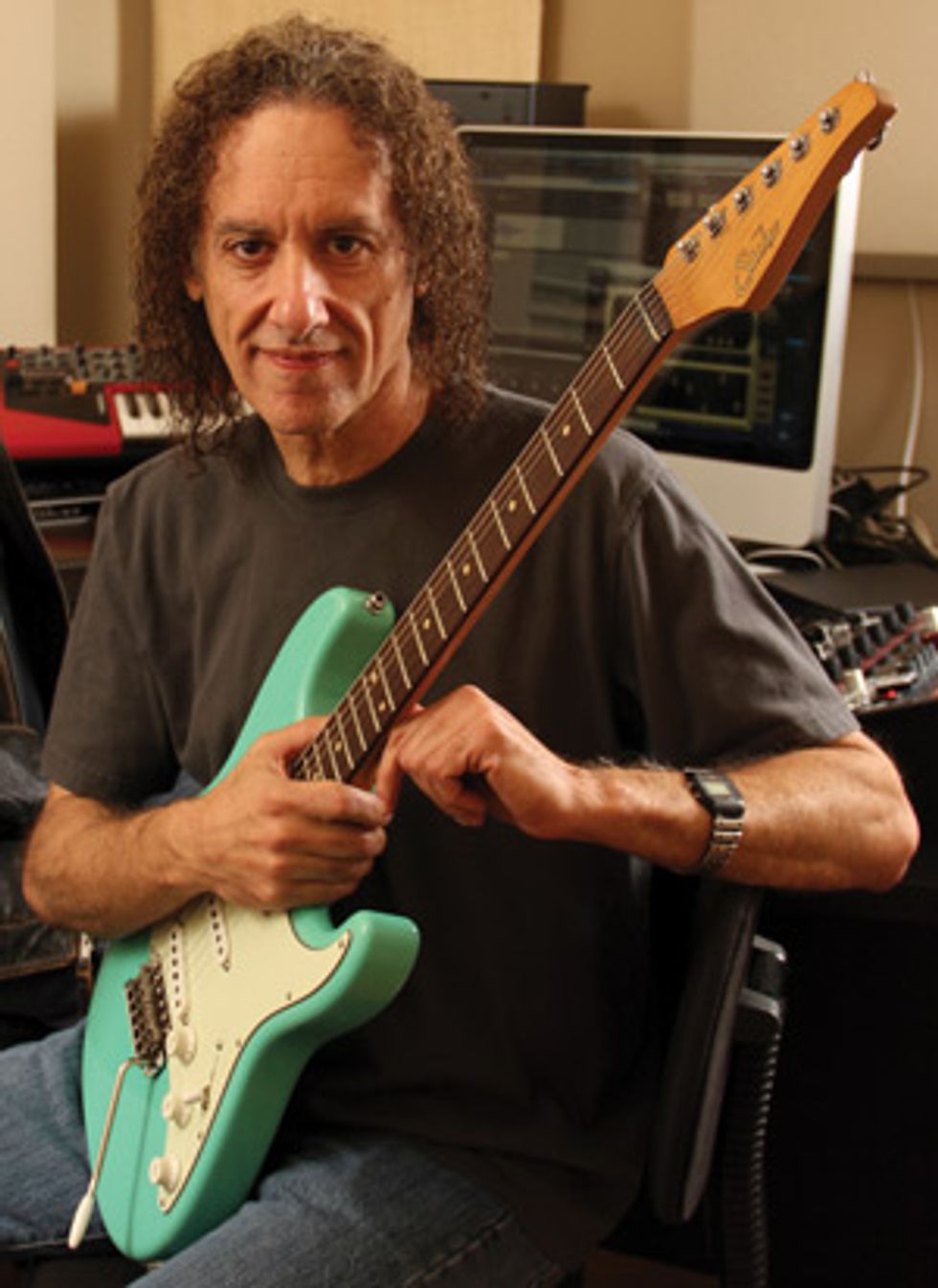
Scott Henderson in the studio with his signature Suhr guitar. Photo by Jessica Pettyjohn
What made you guys decide to play so
much Weather Report material on HBC?
Henderson: Outside of this project, we
all have our own bands. For me, it’s hard
enough to come up with music for my own
trio and I just don’t have time to write for
other projects, so when Jeff called me for
this project I said, “Yeah, I’ll do it as long as
it doesn’t involve writing.” Also, we’re sort
of known as improvisers. A lot of people
really don’t care about the material we’re
playing. They just want to hear Dennis play
his drums, Jeff play his bass, and me play
the guitar.
Berlin: But we’ll never play cliché Weather Report tunes like “Birdland” or “Teen Town.” We do a lot of [the] Wayne Shorter[-written] tunes because he’s one of the guys that harmonically represent my interests in music as well as Scott’s. We both like chords and harmony, and we both like music that doesn’t just go Dm–G7–Cmaj7.
Scott, are some of the Zawinul tunes on
the record songs you played while you
were in his band?
Henderson: No, actually these are tunes I
learned for fun. I’ve always thought that, if
I was going to do covers, I would rather do
covers of keyboard players not guitar players—because who wants to rip off somebody
else who plays your instrument? It’d
be kind of dumb to do John McLaughlin
covers and not have about one-sixteenth of
his chops [laughs].
Although this is a trio record, Scott transcribed
and overdubbed all the keyboard
parts from the original versions to flesh
things out.
Berlin: Lately, Scott’s gotten into guitar
orchestration rather than just, ‘Plug me in,
let me solo, and go home.’ Dennis and I
recorded the basic tracks in one day. Scott
took weeks to do his parts.
Henderson: I’m a big fan of Weather Report—of Zawinul and Shorter—and to pay homage to them, I wanted to make their music kick ass like it does on their own records. Those parts must have been important for them, or they wouldn’t have been on their records. I wanted to fatten it up and make it as big and textural sounding as it did on the original recordings. This meant multiple guitar tracks. I come from a career where your track on an album is basically one track. But when you’re doing a trio, you’ve got an opportunity to make it sound really huge like, Jimmy Page did with Led Zeppelin. My friend Mike Landau has a lot of experience layering, because all of his albums are layered. He mixed two of my records and taught me a lot of cool stuff in the studio.
How many layers might be on a track?
Henderson: Fifteen or 16. I wanted to
keep the mix pretty much the same as
on the originals. If something was low in
the mix on the Weather Report record,
I kept it low in the mix on our record.
Joe [Zawinul] had this secret saying,
“Whenever you do a record, make sure
there’s a bunch of stuff in there that’s
really low in the mix.” It adds ambience to
a record. It’s like seeing a Star Wars movie:
There’s so much there to see that you can’t
possibly see it all in one viewing, you have
to watch the movie multiple times.
In contrast to some of the headier tunes,
the earthy “Wayward Son of Devil Boy”
sounds like it might be more at home on
one of Scott’s blues records.
Henderson: Yeah, that came from our
live shows. After we do “The Orphan,”
which is kind of ethereal sounding, and
“Sightseeing,” which is kind of an atonal
tune, we always went into this blues, just
to sort of freak out the audience. On
Weather Report’s 8:30, “Sightseeing”
comes after “The Orphan,” so we just kept
that the same. We decided to put that on
the album in the same sequence.
Berlin: Scott calls himself a simple blues guitarist, but I don’t buy that—he’s way more than that. But the blues figures greatly into his playing, so when we did all this fusion stuff, he thought a blues [song] might be a nice addition. It also gave me a chance to play as simple a bass line as I could come up with—something Roscoe Beck might have come up with.
Jeff, do you enjoy this type of music?
Berlin: I do—and I enjoy it a lot more the
older I get.
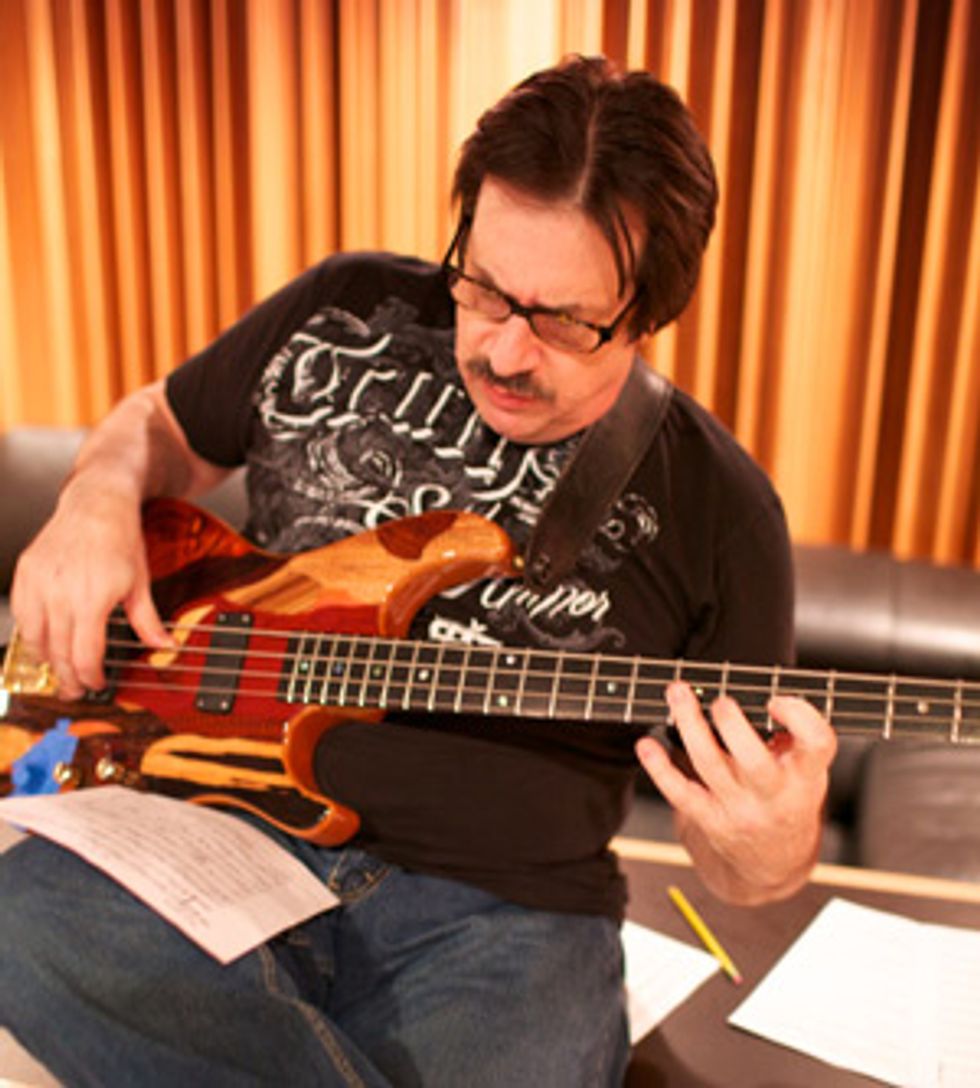
Bass legend Jeff Berlin practices some scales while recording with his trio in 2011 at the Clear Track Studio in Clearwater, Florida. Photo by Brad Kugler
How did having the amazing Dennis
Chambers aboard affect your playing?
Berlin: Dennis is one of the top two or
three virtuoso drummers on the planet.
He pushes Scott and me to the edge of
the cliff, and hopefully we don’t fall off.
I’ve never played with a drummer that
pushed me to the limits of knowing how
to subdivide rhythms as I experienced
with Dennis. Dennis does things that are
almost unimaginable. I always regard this
band as a band with a good bassist, a great
guitarist, and an unbelievable drummer.
Did it take some time to acclimate to
his playing?
Henderson: Well, nobody gets used to playing
with Dennis. You might get a little better
at it, but he’s still going to freak you out
every time. There’s just no way any human
being can hear the one [beat] with some of
the stuff Dennis does. All Jeff and I can do is
tap our feet and watch each other’s foot, and
at least we’ll come in together even if we’re
off from Dennis. We’re always looking at
Dennis like, “Did we make it?” He’ll shake
his head “yes” or “no,” but it doesn’t matter
because we feel like we’re doing a pretty good
job just keeping up with him at all.
Berlin: I can hang with his polyrhythmic playing now. That used to not be the case. It took me about two years to figure out how to play with him. One of the best suggestions he ever gave me was to not listen to him. What he meant was that when he goes into his polyrhythmic thing, if I start to count it literally—subdividing the rhythms that he’s playing—I can’t hear it that way. So what I do is simply count the music where I feel the quarter-note comes in on the downbeat. When I do that, I can play a very strong part under his drum solo, which he relied on as the true quarter-note version of the song we were playing. Dennis would play things so far outside of that, which worked because I wouldn’t get lost.
One of the standout tracks on HBC is
“Footprints.” Jeff, your solo showcases
your unique legato approach. Is that
inspired from your beginnings as a violin
prodigy or from working with players like
Henderson and Holdsworth?
Berlin: It comes from my violin playing.
The legato style is not that popular—or not
even popular at all for bass players. It also
comes from the fact that I have a goal to not
sound like my fellow bass players. I have a
philosophy that if I really want to call myself
different, I had better play differently.
Do you keep your action low to facilitate
the legato approach?
Berlin: It’s very low and very close to
the fretboard.
Scott, your solo on that track is some
of your most exciting playing ever. The
clean tone sounds like you’re using a jazz
box, which you don’t often employ. What
guitar did you use for that?
Henderson: I wanted to do it as a traditional
jazz-guitar thing, because I don’t often
get to do that. I don’t own a hollowbody—
when I recorded Reality Check,
Ibanez loaned me a George Benson
model. I didn’t rent one this time, I used
my Line 6 Variax 700. I ran that into a
Suhr Badger, which warmed it up quite
a bit. I sent the track to a couple of my
friends who actually play jazz boxes, and
they gave me the thumbs up.
HBC in Bangkok, Thailand. Henderson routes his Suhr guitar through a signature Suhr head driving
Marshall 4x12s, while Berlin plays his Dean 4-string through two Ampegs and an unidentified combo.
Scott, you’re also known for your
legato technique, as demonstrated on
the new “Stratus” solo. Early in your
career, you used humbuckers. Now
that you’re using single-coils, is it
harder to play those types of passages?
Henderson: Yeah, physically harder. My
guitars are set up now more for tone
than for speed. The action is a little bit
higher now than it used to be, because
I want my guitars to ring really clear.
Some people like my tone back then.
It might have been a little smoother
because I was using those double-screw
humbuckers, which make the tone
creamy and milky—but there’s no rock
’n’ roll whatsoever in that sound. They
also have no bass whatsoever. They’re
very small sounding. When I listen to
my tone from the old days, it sounds
very thin, whereas now my tone sounds
a little bit more rock, but it’s way fatter
and takes up more space. I’m also using
.011s now instead of .010s, tuned down
to Eb, and they’re a little bit harder to
bend than .010s in E.
Jeff, do you tune down to accommodate
Scott’s tuning?
Berlin: No, I play in E. They detuned
me for the record, because Scott likes
the Eb tuning, but I can’t function in Eb.
When we’re on the gig [live], Scott plays
in E.
Tell me about some of the unique features
of your signature instruments.
Berlin: My bass is a Dean 4-string with
passive Bartolini pickups. I know active
is popular, but I prefer passive because I
don’t like the sound of active pickups—they sound artificial to me.
Henderson: My Suhr signature model is not really that far away from Suhr’s Classic model. The only thing that makes it a Scott Henderson model is that, instead of a C-shaped neck, it has a D shape—which has a little less wood on the back and a little more on the sides. Also, my model has a real Fender 6-screw bridge—it won’t sound like a Strat if it doesn’t. That’s, like, amazingly important. People have said to me, “I got a Suhr and it doesn’t sound like a Strat, what’s wrong?” They’ve got some kind of Gotoh 2-post bridge on it, and I’m, like, “Well, half the sound of a Strat is the bridge.” Anything else is not going to sound like a Strat, because the regular 6-screw vintage Strat bridge is going to give the guitar twice the bass of a 2-post bridge.
Another thing that’s different about my guitar—and this is kind of a cool thing that a lot of my students have copped—is that, when most guys use the two and four positions on a Strat, they want them to be bright. But I have the tone controls disabled on the two and four positions, because I have the treble rolled down on my treble pickup, so if I switch to two or four, I’d have to take that tone knob and roll it all the way up and then roll it all the way back down when I go back to the treble pickup. I’d be messing with my tone knob all night and it would drive me nuts. When the tone control is disabled, it’s just like the treble is up all the way.
Henderson insists that his Suhr guitars have a traditional 6-screw bridge for authentic Strat tones,
while Berlin prefers passive Bartolini pickups in his signature Dean bass. Photo by Jessica Pettyjohn
What do you use the two and four
positions for?
Henderson: I usually use it for funky
rhythm stuff. I use it when soloing, too.
When I want the solo to just come out
into your face, I’ll switch to one of those
in-between positions. But the cool thing is
that, when I go back to my treble position,
the knob is still where it was.
Jeff, you’ve employed a unique chorus
sound for a long time now. What pedal
is that?
Berlin: I’ve used the same pedal for 20
years. [One year] I was performing [for
the pedal manufacturer] at NAMM, where
demonstration of gear is mandatory, and I
didn’t charge a penny—I didn’t ask them for
anything. But two years in a row I forgot to
bring my own. I asked the company twice
if I could use their pedal [at NAMM], and
one day I got an email that said, “We’re
tired of loaning you your own pedal. We’re
not lending you one anymore—bring your
own.” I wrote them and said, “Well, why
don’t you have me as an endorser?” The
response I got—and I’m quoting here—was,
“We had a meeting and we decided to pass
on that one.” Now, I’ve sold six figures’
worth of amplifiers for Markbass, and I’ve
sold tons of basses for Dean, but with these
guys the only way I felt I ought to react in
regards to how cheaply they treated me was
to never mention their name. I haven’t sold
anything for these guys.
Jeff, over the years, you’ve developed a
reputation as having a somewhat inflammatory
personality. Is it true that you got
banned from a bass forum?
Berlin: The forums don’t count, because
the forums are [full of ] amateur musicians
all trying to function as professionals before
they’re ready to do so.
Your unwavering positions against metronome
use and rock music education’s
validity are both controversial and legendary.
Can you touch on those topics briefly?
Berlin: I say things I regard as truthful and
that I can prove—there’s nothing I say that
I can’t back up. The metronome is not useful
at all, because time doesn’t come from a
box that clicks. Rock schools, rock camps,
or rock lessons are entertainment—they’re
not going to help you play better. The blind
are leading the blind. Teachers that don’t
know about music are teaching people that
don’t know how to play and aren’t getting
better, and everybody’s happy but me.
Scott Henderson’s Gear
Guitars
Suhr Signature model,
Line 6 Variax 700,
’90s Gibson Les Paul,
Gibson SG
Amps
’71 Marshall head,
Suhr SH-100 signature head,
Kerry Wright 4x12 with
Celestion 25-watt Greenbacks,
Fender Bandmaster modded
by Alexander Dumble,
Fender Hot Rod Deluxe,
Marshall DSL head
Effects
Xotic RC Booster,
Maxon SD-9,
Fulltone Octafuzz and Plimsoul,
Z.Vex Fuzz Factory,
Arion SCH-1 with true-bypass mod,
Vertex Effects Systems Axis wah,
Boss SE-70,
Boss RC-2 Loop Station,
Vertex-modded Boss FV500L
Strings, Picks, and Accessories
D’Addario .011–.049 sets,
Fender heavy picks,
Strap King straps,
Xotic XGC-1 Scott Henderson
signature cables,
Suhr MiniMix II (for isolating the
wet signal from the Boss SE-70),
Vertex pedalboard,
Tech 21 MIDI Mouse,
Snark SN-8 tuner
Jeff Berlin’s Gear
Basses
Dean Jeff Berlin signature 4-string
Amps
Markbass CMD 151P signature
1x15 combo
Effects
Unnamed chorus pedal
Strings
DR Strings DDT .040–.100 sets
Do you enjoy playing rock bass?
Berlin: I like being available to people
that call me to play simple music, because
I don’t enjoy constant virtuosity unless I
put myself in that situation to perform it.
I’d really much rather play rock or pop. I
just did a record with a guy who produced
Judas Priest and Black Sabbath. I questioned
constantly, “Is this what you want?
Am I doing this correctly?” And I got a lot
of affirmation that I was one of the best
rock bass players they ever worked with,
because I tried to represent the music correctly
and I added a little bit of my Jeff
Berlin-isms in there. That combination
seemed to work.
Didn’t you turn down the Van Halen gig
back in the day?
Berlin: I turned Van Halen down because,
when you join a band, you join it in its
entirety. I didn’t wish to take the gig just to
make a paycheck and then maybe leave the
band. It’s not the correct thing to do with a
band that is as legendary as theirs.
Would you take the gig now if Van
Halen asked?
Berlin: Well, I should be in the band now,
but I’ll explain that in a second. When I
did it then, they were into activities that I
preferred not to participate in, so I bowed
out. My maturity puts me in the area to play
simple rock, but I can add stuff that really
is not easy to find in other bassists. But of
course, Eddie’s son has that gig, and as long
as he’s doing a good job and everybody seems
to like the band, then I won’t get the call.
Can you elaborate?
Berlin: I would do things that they expect
and also provide them with things that
would hopefully, and pleasantly, be unexpected
to them.
Henderson: I can’t even imagine Jeff playing in Van Halen. That gig calls for a 100-percent-support bass player, and I just don’t think that’s a good fit. As far as just playing on a pop or a rock gig, we all have our moments when we wish we made more money but nobody wants to play music that they hate. Not saying that Jeff hates Van Halen—because we all love Van Halen. I think Van Halen’s a great guitar player and I always have really liked his playing. But I couldn’t play that music all night and be myself, and neither could Jeff. I think there are very few pop gigs outside of maybe Steely Dan or Beyonce where I would enjoy myself. Anybody else, I feel like I’d have to dumb my stuff down. To be on a pop gig that you don’t like, you have to be an actor, and I’ve never been much of an actor. But Steely Dan or Beyonce—if they call, I’m there.
YouTube It
For a taste of Scott Henderson and Jeff Berlin live, doing what they do best,
check out the following clips on YouTube.com. Note that Henderson has
exacting standards for YouTube videos of his playing—he’ll vigilantly take down
videos he doesn’t like, so watch these while you can!
Henderson, Berlin, and Chambers
tear it up live on “The
Chicken,” a classic jam tune
by saxophonist Pee Wee Ellis.
Henderson uses one of his
aqua Suhr custom models to
solo over a bluesy vamp with
Chambers and Berlin.
Berlin was one of the first to
cast the electric bass in a
lead role. Here, he plays an
unaccompanied rendition
of Eric Clapton’s “Tears in
Heaven” that encapsulates
the pioneering elements of
his style, including a more
chordal approach and virtuosic
runs.
Darryl Jenifer and Gary “Dr. Know” Miller of Bad Brains discuss their trailblazing fusion of disparate styles—from jazz to soul, reggae, punk, funk, and metal—as well as how their new album, "Into the Future," totally lives up to its name, and what it’s like to be both legends and underdogs more than 30 years into their career.
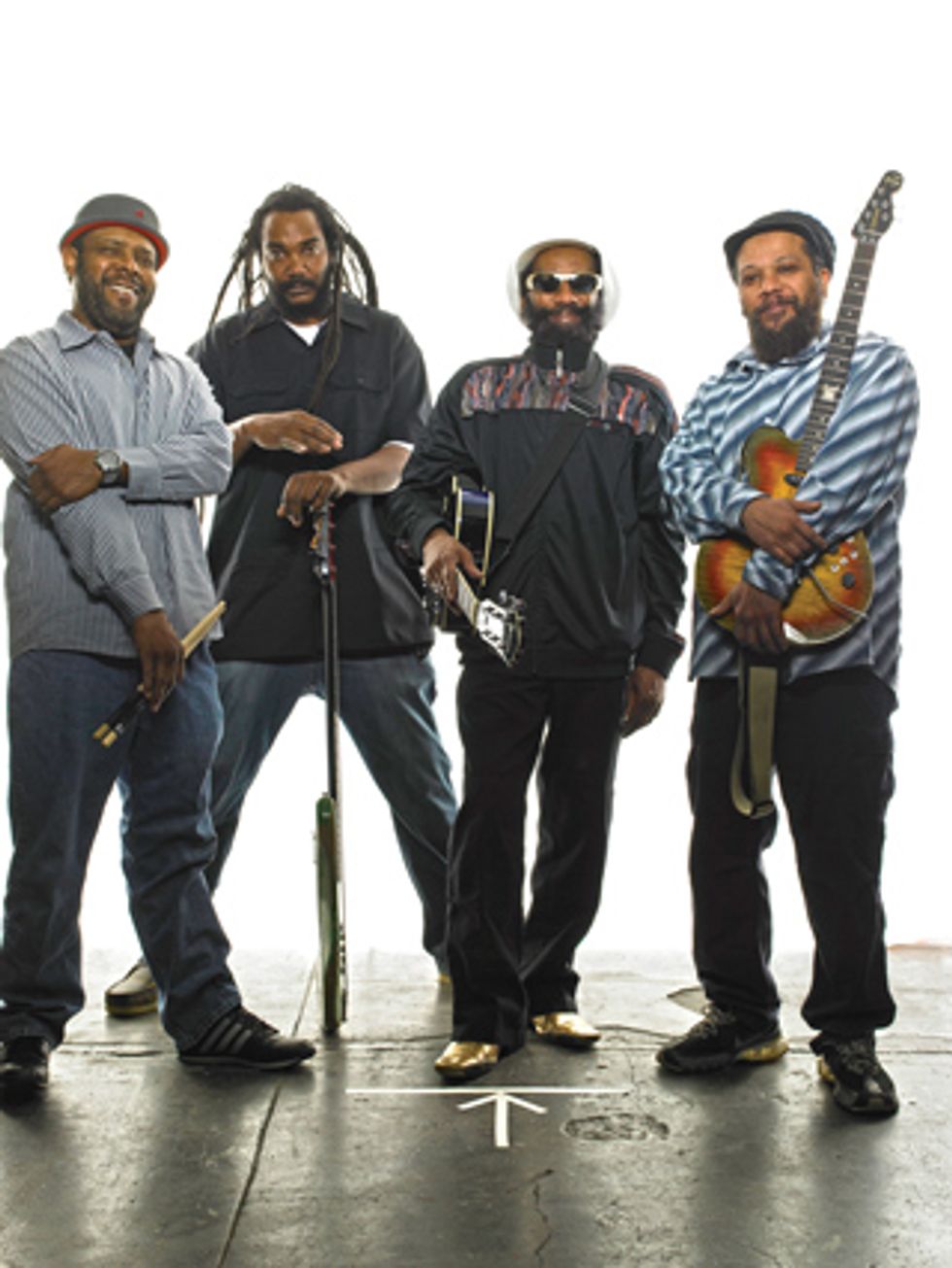
Photo by Frank Okenfels III
When it comes to bands who’ve altered the course of musical history with mind-blowing creativity and yet somehow never really gotten their due, Bad Brains is right up there with Spirit, the Velvet Underground, Moby Grape, and the Stooges. Despite these bands’ stylistic differences, each shares the distinction of dragging modern music kicking and screaming in a fresh new direction and heavily influencing countless bands that went on to greater fame and fortune.
To be fair, in the case of Bad Brains, the fault wasn’t entirely that of fate or a fickle music industry. The band’s lack of mainstream success has had at least as much to do with their two-edged eclecticism and the unpredictability and substance-abuse issues of lead singer Paul “H.R.” Hudson—a savant who, in his heyday, could seamlessly channel the most alluring elements of Curtis Mayfield, Bob Marley, Johnny Rotten, and a rabid old-school hip-hop emcee.
Formed in Washington, D.C., in 1977, the Brains began as a Return to Forever and Mahavishnu Orchestra-inspired jazz-fusion outfit called Mind Power. But then the four—H.R., drummer brother Earl Hudson, guitarist Gary “Dr. Know” Miller (aka “Doc”), and bassist Darryl Jenifer—got turned on to Black Sabbath, the Damned, Bob Marley, and the Ramones (a song by the latter inspired their name change). Just as importantly, they all joined the Rastafari spiritual movement, which would henceforth imbue their work with a message of peace, positivity, and perseverance.
Even so, within two years of their newfound fascination with raging volume, seemingly incongruous genres, and “the Great Spirit,” Bad Brains had been banned from most D.C. clubs because of their raucous stage performances. And though Jenifer, Doc, and Co. went into the studio soon after relocating to New York City in 1980, the reverb-drenched reggae-punk tunes from those dates inexplicably laid dormant until the 1997 release of The Omega Sessions EP. Consequently, Bad Brains’ first official album was 1982’s eponymous ROIR Records release—a debut chock-full of breakneck beats, raging power chords, raw-toned shredding, and bass lines so thrash-tastic they make your hands hurt just listening to them.
Bad Brains Must-Hear Moments
You can’t call a band legendary and then leave people hanging around with no proof.
Check out these tunes on Spotify, YouTube, iTunes, Rhapsody, or your MP3 store of choice.
“Stay Close to Me”
The Omega Sessions (1980)
Gary “Dr. Know” Miller’s tastefully restrained chukka-chukka reggae
rhythms float atop a warm wave of reverb, alternating with crunchy
power-chord stabs in the choruses, while Darryl Jenifer’s bass lines
bob and slither irresistibly, and H.R.’s vocals paint a picture of a
Rasta-inhabited Motown.
“Big Take Over”
Bad Brains (1982)
Doc layers Morse code-like pickup-pole tapping over a tapped lick
on the intro to this barnburner before Jenifer and drummer Earl
Hudson jump in with a relentlessly pulsating drive. At 2:14, Miller
augments his feedback-soaked solo with subtle wah.
“Right Brigade”
Rock for Light (1983)
Working with the Cars’ Ric Ocasek in the studio, Bad Brains redid
a few tunes from their previous album, including “Rock for Light.”
The whole album shifts a bit more toward metal, and at 1:30 on this
track Doc rips out a solo with a catchy pull-off lick punctuated by
bent notes that offer a breather before he shreds his way up the
fretboard.
“Return to Heaven”
I Against I (1986)
Doc starts things off with a reverse whammy-bar dive and an
angular progression before the song settles into a midtempo funk-metal
groove of the sort that actually does both genres justice.
H.R.’s vocals vacillate between ethereal and swirling jungle calls,
and at 1:50 Doc’s razor-toned solo begins and ends with hummable,
impeccably timed triplets and climaxes in the middle with a
rapid-fire staccato lick.
“No Conditions”
Quickness (1989)
H.R. rejoined the Brains after Jenifer and Doc cut the instrumental
tracks with Cro-Mags drummer Mackie Jayson and singer Taj
Singleton, but thankfully they swapped the latter’s tracks with lastminute
H.R. cuts. The result is a powerhouse riff fest with snarling
vocals, raging artificial harmonics, a lyrical, delay-drenched solo,
and a totally moshable groove.
“Let There Be Angels”
Build a Nation (2007)
Whereas so many artists mellow out and settle down as they age,
Doc, Jennifer, and Earl Hudson send that notion to the afterlife on
this number from the Adam Yauch-produced album—it positively
seethes with some of their fastest, tightest, and most ferociously
chugging grooves ever.
Their 1983 follow-up, Rock for Light, was produced by the Cars’ Ric Ocasek and featured a more metallic edge, but it wasn’t until 1986’s I Against I that the band got any real visibility. Produced by Ron Saint Germain (Sonic Youth, Living Colour, 311), it boasted a masterful blend of dynamics, a more organic-feeling interweaving of styles, and an overall looser, funkier vibe—all complemented by just the right amount of studio polish. It got airplay on MTV and had an undeniable influence on bands like Living Colour, Fishbone, and the Deftones.
But from that point onward, H.R.’s eclectic personality, itinerant tendencies, and desire to focus more on reggae/dub, world music, and jazz, pretty much threw a monkey wrench in Bad Brains’ plans every time things got going in their favor with major labels and high-profile advocates within the industry. He and drummer/brother Earl left and returned to the fold multiple times over the years, and each time Jenifer and Dr. Know would soldier on with various frontmen and drummers, none of whom could hold a candle to H.R. and Earl.
H.R. hasn’t changed a whole lot in the new millennium, either. The 56-year-old is as unpredictable as ever (at a 2006 CBGB's show, he showed up wearing a bulletproof vest, a motorcycle helmet, and a headset mic that made it difficult to hear anything he said), but when he’s guided by a steady hand in the studio—as he was by the late Beastie Boy Adam Yauch (aka MCA) for 2007’s Build a Nation—he’s stepped up to the plate and helped Doc (now 54), Jenifer (52), and brother Paul (55) hit it out of the park.
Last November, the legendary foursome released their 10th studio album, Into the Future. While the vitality and seething energy of H.R.’s youth is understandably in short supply—he’s now more inclined than ever toward reggae-flavored paeans to “PMA” (positive mental attitude)—he still turns in dynamic performances like only he could. Meanwhile, Doc, Jenifer, and Paul Hudson flex their juggernaut chops in all the ways die-hard Brains fans wanted them to—and then some.
We recently spoke with Jenifer and Doc about the sessions for the new album, their go-to gear, and their long, storied career as hardcore legends fighting to get their due.
Into the Future is stacked to the gills
with the sorts of inimitable Bad Brains
grooves that no other trio of musicians
on the planet can replicate—even when
the progressions are simple. What do you
attribute that to?
Darryl Jenifer: We started out in our teens
and early 20s, and it’s about building chemistry.
Our chemistry goes way back to, like,
1978. We’ve played together for so many
years that it doesn’t really matter about the
notes—it’s just the combination of our different
sensibilities about what we’re doing.
When we go to break it down to mosh
sections of chunk, the way Doc mutes his
guitar, the way I like to hear chords and
octaves—it’s all about our sensibilities. It
just comes from playing together—and
struggling together, more than anything.
I shouldn’t even say “playing together,”
because a lot of cats can play together but
they never really develop a chemistry. It’s
about struggling together, living together,
and trying to achieve your goals. I think any
combination of musicians can achieve that.
Gary “Doc” Miller: That’s what it’s about. We went to school together, we’ve known each other for 40 years or more, and we’re brothers—and H.R. and Earl are siblings. [Laughs.] It’s personal and spiritual—it’s all connected.
Does that “chemistry” extend beyond just
musical considerations?
Jenifer: I’m talking about lifestyle chemistry—growing up with each other, knowing
if a cat’s grumpy or likes to joke all the time
or if one guy’s serious. All these personality
traits come together when we sit down
to make music, because we’re brethren—brothers together. We get angry with each
other, we get joyful with each other, and
all of that comes through in the music.
When we say, “All right, Doc, we’re going
to go from G to G# and then we’re going
to break it down here and do this and then
take off really fast”—once we communicate
that to one another, then our chemistry of
knowing and loving each other and going
through shit with each other takes over and,
thus, you have the Bad Brains sound.
Doc, you were a pretty accomplished
fusion bassist before switching to guitar
in the mid to late ’70s, right?
Jenifer: He was a very proficient bass
player. Like, way better than I was—than
I am. Doc is sick on the bass. He was the
dude that everybody wanted to play like
when we were coming up as teenagers. He
was so good on the bass that I didn’t even
want to go around when he was there. He
could play all that Graham Central Station
stuff—like “Hair”—the way it really sounded
on the record.
Doc: Yeah, I used to play the bass back in the day, and Darryl used to play the guitar. We were in garage bands playing funk covers and whatnot.
Did starting out on bass make you
approach guitar differently when you
changed over?
Doc: Absolutely, absolutely. It made me a
foundation and made me a good rhythm
guitar player. It made me understand music
from the roots. A lot of times I write on the
bass or I think like a bassist—I think about
holding it down. Both of us are like that.
Darryl is like a rhythm guitarist and bass
player in one. Every time I play with other
bass players, I’m, like, “Where’s the oomph?”
That’s why we never took on another guitar
player, and that’s why I do my rhythms and
my leads the way I do—because Darryl just
holds it down.
Which players inspired you guys in the
early years?
Doc: I was really influenced by players like
Verdine White [Earth, Wind & Fire] and
Stanley Clarke. It was, like, “Damn—these
dudes are out there.” Verdine is crazy. I
used to dibble and dabble in the fusion of
the early ’70s, too. I’d wear those records
out trying to see what the hell was going
on there. [Laughs.] Return to Forever was
definitely influential on guitar and bass. It
was inspirational for me to start playing the
guitar when Al Di Meola got in [Return
to Forever], because he was so young and
such a badass. I was, like, “Yeah, uh-huh—I
could do this.” [Laughs.] I liked all the
Return to Forever guitarists—Bill Connors,
Johnny Mac [McLaughlin]. I liked Allan
Holdsworth. On bass, it was Larry Graham.
I had the beautiful opportunity to see all
these people over the course of a five-year
span. We saw Earth, Wind & Fire four or
five times, and P-Funk played every month
in their heyday in D.C. Yes, Zappa, Thin
Lizzy, Graham, and all the funk and soul
stuff—Tower of Power. You name it, we
saw it. It was all happening, every week.
Jenifer: As far as rock, it was Sabbath and “Iron Man” and shit like that—but I also grew up with a lot of stuff like John McLaughlin and Return to Forever. That was out when I was young—15 and 16. I listened to a lot of music-school cats when I was coming up, but also a lot of Motown.
You’ll be stoked to hear we’ve got an interview
with Larry Graham in this issue.
Jenifer: That’s my hero! Without him, I
wouldn’t be nobody on the bass. Without
Graham, there’s no DJ, to tell you the truth.
Between him and [James] Jamerson. . . .
Darryl, you started as a guitarist—how
did that come about?
Jenifer: I had a cousin that played the guitar,
and I was really young—about eight years
old—and he had a band, a funkster sort of
band, and I found it fascinating. All the amps
and the chrome and all the sparkling stuff—I
just got attracted to it at a very young age.
My cousin told me if I could learn to play
something then he would let me play in the
band. He wound up selling me his guitar,
and I taught myself how to play stuff like
“Get Ready” by the Temptations—just the
first part, like [hums opening riff]. And then
it grew into a competitive thing, like, going
into the alley—back then it wasn’t about rapping
and all. I’d be out there and I’d say, “I
can play Ohio Players” or whatever. And then
you’d run in the house and get your guitar
and come back out to the alley and show off
that you can play little parts.
How long after that did you start
playing bass?
Jenifer: When I was about 12, the guitar
went in the closet and I started playing with
model cars and riding my bike. Then when
I got to be about 13, I pulled it back out
and got into bands around my neighborhood.
I was in a little band called the Young
Explorers, and we were playing early-’70s
funk. I played rhythm guitar, but every
time the band would take a break, I would
ask the bass guy, “Can I play your bass?” I
used to pay him sometimes—“I’ll give you
three dollars if you let me play your bass for
a little while!” [Laughs.]
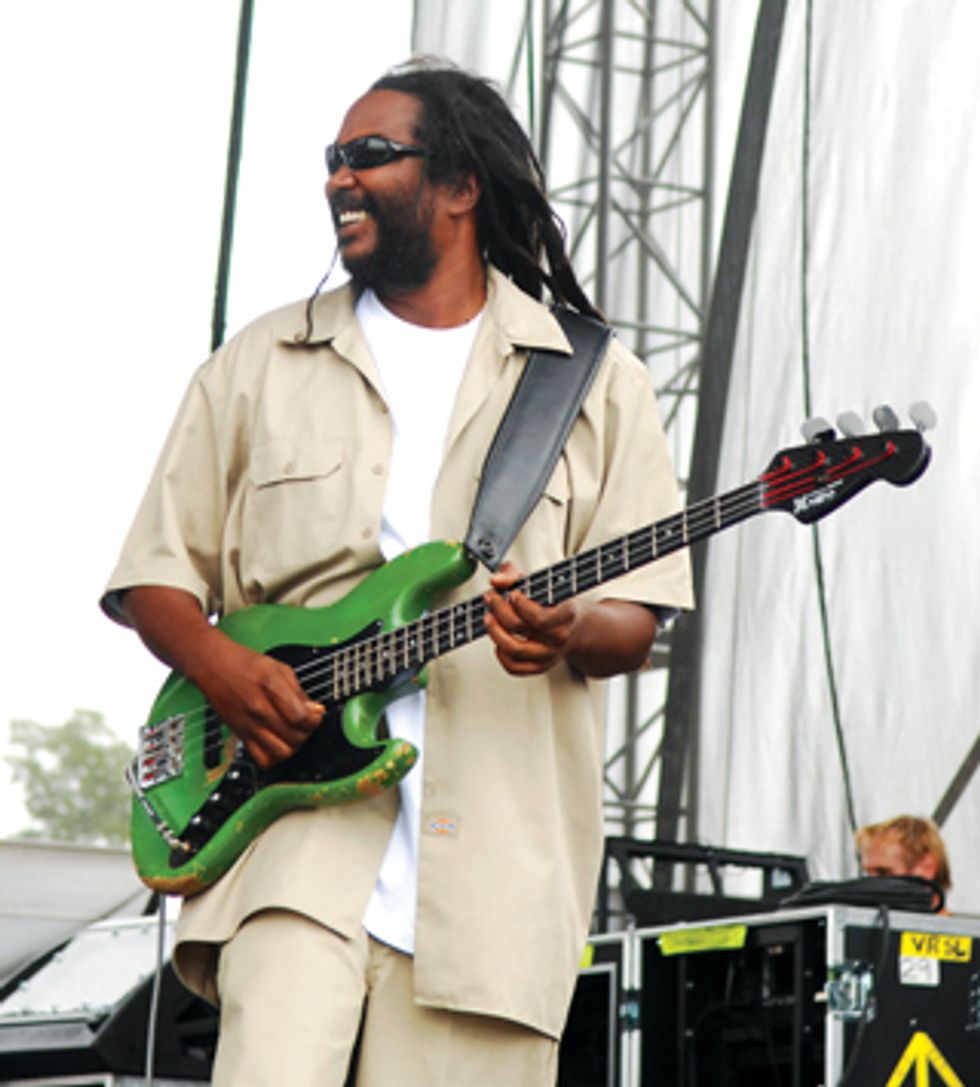
Darryl Jenifer with his go-to ’81 Modulus graphite bass at the Virgin Festival in Baltimore, Maryland, on August 5, 2007. Photo by Eddie Malluk
Do you think it affected your style to start
out on guitar and then switch to bass?
Jenifer: Because I was a rhythm guitarist
and I was tuned in to Sly and the Family
Stone—“Thank You (Falletinme Be Mice
Elf Agin)” and all that—I think it gave me
a certain insight. I really know the inner
workings of the motion between rhythm
and bass. Some people hear me say that
I’m not a musician. I give musicians credit
because they took the time to learn music
[theory] and all that, but I have the knack to
lay it down. To lay it down is different than
knowing music. There are a lot of cats that
know music, but they don’t know how to
lay it down. My whole career has been about
inventing my own style on the fretboard. I
look at the fretboard like Braille, in a way—it never meant notes, like, G and F and B
and C to me. I guess I had ADD or something,
because I never really cared about it in
that way. I only cared about it in the way of
creating these little passages and movements.
When you joined up with Doc and the
rest of the band, the roles were a little different
than now, right?
Jenifer: When we got together, Doc was on
guitar and H.R. was playing bass, and Earl
was playing drums. They had a fusion group
called Mind Power, but we all went to the
same high school and hung out in the same
places. Being brothers and dudes in the hood
and all playing music, we all knew each
other. H.R. wanted to be the singer, so he
said, “Let’s get Darryl to play bass.” Earl was
just developing his fusion sensibilities, Doc
was kind of getting into being an intellectual
kind of guitarist—wanting to bring some
sort of spirituality and thoughtfulness to his
playing. He didn’t want to be a shredder. We
wanted to be musicians, not just dudes playing
some shake-your-rump-type shit.
So when we were on this thinking-man’s jazz-fusion trip, I was still listening to rock music, but my buddy Sid McCray came over to my crib and had the Ramones and all that stuff, and I thought it was loud and cool. Having a fusion background and aspiring to be like Return to Forever, and then hearing the Ramones, I just said, “Yo, if cats think this is fast, watch this.” What punk rock brought was a certain freedom to riffs. Bad Brains took the freedom and the raucousness and the roughness of punk rock, but brought a little thoughtfulness to the musicianship.
There are very few musicians on the planet
who take inspiration from Return to
Forever and the Ramones and Sabbath.
Jenifer: Everybody has their blessing—I feel
blessed that I’m versatile. But it’s a struggle.
When I was a teenager, my cousin—who I
love—she used to say, “Darryl, why do you
listen to [fusion]? You’re crazy—you can’t
even dance to that!” There’s a lot of people
that are, like, “How do you get enjoyment
out of listening to [Return to Forever’s]
Romantic Warrior over and over and over and
over?” If they had Romantic Warrior on karaoke
[laughs] . . . I know every riff, measure,
beat . . . everything. I listened to that album
a billion times, and I played the bass till I
fell asleep. As a teenager, I was completely
into it—I didn’t go to school . . . My father
snatched the bass from me one time and
held it up like a hatchet and wanted to hit
me! Every time he saw me, that was all I was
doing. Imagine you’re living with your teenage
son in an apartment in D.C., and every
time you come home from working hard all
day, he’s sitting in there, the place smells like
weed, and he’s playing the bass! [Laughs.]
Doc: We always liked music—from Bob [Marley] to Sabbath to the Clash to the Damned to Return to Forever. We would see these bands, and we never got pigeonholed or stereotyped music. As long as it was good music, we were into it. In the early ’70s, there was a lot of good music, and we were just open—like a sponge. Who’s to say you can’t play whatever you like? That’s why we are who we are. With the metal [influences], it was about the power. With the punk, it was the speed—although a lot of the fusion had the speed, too. It was marrying the power, the musicianship, and the speed to give it that superdynamic-ness.
Jenifer: Washington, D.C., is a really sophisticated music place in general. There was a friend of mine who brought records like Rare Earth and Return to Forever to art class. You’ve got the radio station WPGC, and they’re playing, like, “Taking Care of Business,” then you’ve got go-go music going all the time on the basketball court and everywhere in your life, and then you’ve got your Motown and soul music and your church music—it’s just all a part of your life. So if you’re a musician dude, you’re going to say, “Damn—I like that!”
I used to listen to . . . we used to call it a “white-boy” radio station. I used to be able to play [Kansas’] “Carry on My Wayward Son.” [Sings main riff.] So, as a teenager from a black neighborhood, I would hear it on the radio and know that it was a cool guitar riff. I knew how to play “Iron Man,” I knew how to play the beginning to “Stairway to Heaven.” But also I knew how to play stuff off [famed fusion drummer] Billy Cobham’s Spectrum. I knew how to play [New York City funk band] Mandrill. I knew how to play a lot of the [Larry] Graham stuff.
Were you two and Earl pretty much on
the same page with all of that, or did you
guys introduce each other to new music
and then evolve together because you
were open-minded?
Jenifer: There were different levels between
us all. Earl was more into the jazz-fusion—he was listening to a lot of Earl Klugh and
George Duke—and when it got down
to me, that’s where the Sabbath and the
Zeppelin came from. As far as rock, H.R.
and Earl were more into the Beatles and
stuff like that—stuff I never really listened
to. Doc was more about Mandrill and early
Return to Forever, like, Where Have I Known
You Before—before Romantic Warrior.
So you basically wanted to marry the
musicianship and phrasing of fusion stuff
with the tones and power of metal and
the chaos and freedom of punk?
Doc: Yeah, you could say that. It was the
need for all of that, definitely. I’m sure there
are a lot of musicians who have the same
respect for different types of music, but
were—or are—afraid to pursue that because
of peer pressure.
They pigeonhole themselves because
they’re unsure of how marketable it will
be, you mean?
Doc: Definitely the marketability. I mean,
how do you market us? That’s our biggest
thing. It’s like, “Well, you’re not this and
you’re not that.” We’ve heard it a million
times, “We don’t know what to do with
you guys. It’s [expletive] great, but what
do we do here? What category . . . we can’t
put you on the radio.” [Laughs.] It’s like,
“Whatever . . . we do what we do. Thank
you, but no thank you.”
Why did your first recordings, The
Omega Sessions, not get released for 17
years? They’re incredible—every bit as
good as your first official release.
Jenifer: Y’know, sometimes stuff like that
is just a part of the life you’re living and it’s
not really looked at like a product or something
to be released. But I’d be the wrong
guy to ask that—Doc would probably
know more about that.
Doc: I don’t know what the heck happened, actually. We recorded it in a house. I was in the basement, Darryl was in one of the bedrooms, and H.R. was actually outside. We used a 4-track with big old knobs on the board—big ones. I think it was actually a Radio Shack [recording console] kit. I was, like, “What the hell is this?”
That’s amazing—that album has such a
live sound. It sounds like you’re all in the
same room.
Doc: No, we were all over—wires going
everywhere. That’s why you can hear me say,
“Can you hold this for a second?” [Laughs.]
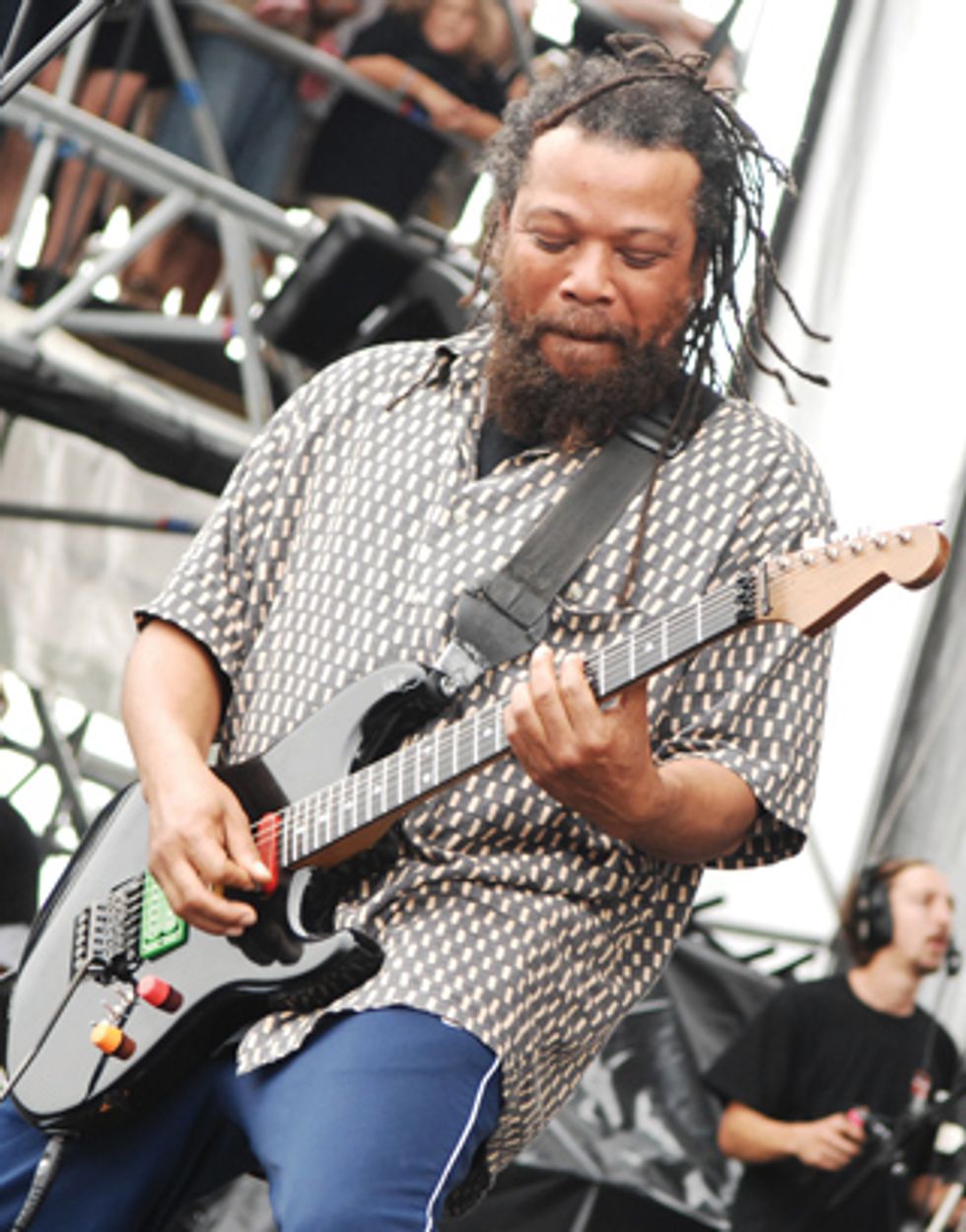
Gary “Dr. Know” Miller onstage at the 2007 Virgin Festival in Balitmore, Maryland, with “Old Blackie,” an S-style axe with ESP body and neck, and custom DiMarzio pickups. Photo by Eddie Malluk
You guys got some early praise for 1980’s
“Pay to Cum.” Even by today’s standards—
where you can see a crazy-good
8-year-old playing on YouTube—that
bass line is incredibly fast and difficult.
What do you remember about writing
that, Darryl?
Jenifer: Well it wasn’t that fast at first. It
started very slow, but the times change.
We’d play “Pay to Cum” at a show in the
late ’70s and early ’80s, and the kids who
thought we were playing fast would start
their own bands and then they’d play faster
than us. Then we’d end up playing at gigs
where we’d come on after them—so then
we end up playing faster than them. But it
wasn’t conscious. That’s just what happened
when Earl got back there and counted off
with his sticks.
I Against I is often considered the first
fully realized example of all the classic Bad
Brains elements—it’s got hardcore, metal,
and reggae, but it’s also surprisingly funky.
Did Ron [St. Germain, producer] help
forge the Brains sound, or was he merely
witnessing part of your evolution?
Doc: The Spirit produces our records—us
and the Spirit. Ron was influential in capturing
the essence of the music. We went
to a lot of different studios—like, the best
studios in the world. Ron would dial that
shit in and say, “All right, hit it boys—bam!” Ron will shoot from the hip. He’s so
freakin’ talented.
Jenifer: He did some things, but mainly effects, like on “Return to Heaven”—he did the little delay shimmers and stuff that you hear in the chorus. But as far as “House of Suffering” and all the rock shit, no one knows what to do with that except to let us get a good sound and kick it.
As far as the bass lines, I was trying to bring in a little Graham [vibe]. Sometimes I play with a pick and my [plucking-hand] fingers and my thumb on one song. Like on “Secret 77,” I wanted to play the thumb on the verse, and then I dropped to the pick during the bridge, and then my fingers during the chorus. So I go from snapping it—not a real bona fide funky snap, but more of a hybrid funk snap—to regular, lay-it-down and complement-the-chorus- type finger work, like Jamerson.
Do you curl the pick up under one
finger or what?
Jenifer: It’s in the folds in the palm of
my hand, and then I can drop it down
when I need it.
Let’s talk about the new album.
“Popcorn” is prototypical Brains—it’s
got angular, syncopated power chords
ripe for the moshing, but it’s also evolutionary:
Doc, during the choruses
you’re playing these dense, complex
chords that are pretty uncommon to
hear in a setting with such thick distortion.
And Darryl, you’re playing some
of your most overtly funky bass lines
ever. How did that song come about?
Jenifer: That’s a song that’s driven
by H.R. He was in one of his good
moods—like, “It’s on like popcorn with
all the pretty ladies!” That’s a D.C.-like
rock-funk hybrid, a combination of
being from the hood and go-go—like
Chuck Brown meets the Bad Brains.
Doc and I put our minds to the chunk,
but we didn’t want the chunk to be the
same old chunk. Doc is always reaching—always going somewhere else—and
I’m always trying to make it so you
don’t notice that he’s trying to go somewhere
else! I’ll look at him and think,
“Why is he looking for another chord
or somewhere else to go?” I’m more of a
minimalist, and he’s keeping it going. He
knows what he wants to play—he doesn’t
want to play that same old shit.
Doc: I don’t know how we do it—we just do it. Making all the different flavors fit is just second nature to us. We don’t even think about it. It just happens.
But do that many different types of
sounds come together pretty fast, or did
that song get hammered out and evolve
over time?
Doc: Ninety-nine percent of the time, they
just come like that. It’s just, “All right, let’s
go to the B.” “No, let’s go to the C.” “Play
the Z# there. “Okay!” “Y’know that chord
there—that Fmaj7minb5 to the fifth power?
That! Here we go—bweeeeee!” [Laughs.] We
don’t really sit down and beat the damn
songs up—then all of the vibe is gone.
Speaking of musical technicalities, where
did you learn your chord and scale theory?
Doc: Books and just playing, y’know?
I had an old Mel Bay jazz book. And I
would buy Stevie Wonder tablature books
and theory books on [scale] modes and
whatnot. I picked out a few scales that I
liked, and it was like, “Let’s write a new
song. I just learned this scale—let’s start off
with this.”
“Make a Joyful Noise” has some of your
most overt fusion tones ever, with those
Wes Montgomery-type octave parts and
the really clean, modulated tone.
Doc: This record was unique in the respect
that we wrote it in the studio. So we had
to rehearse after we recorded the stuff in
order to learn the songs again—because we
would write and record a song and then
move on to the next one. We said, “Let’s
just go in and roll the dice.” I always try to
keep it fresh for myself so I don’t get bored.
[Laughs.] It’s creativity—you can’t be a
cover band of yourself.
On songs like “Fun,” where there’s this
really badass, syncopated chugging, do
you use a noise gate to make the cutoffs
between grunting chords tight and more
articulate, Doc?
Doc: I mostly mute it with my hands. Live,
I use a little gate, but it’s mostly muting
with the palm.
Let’s talk more about your gear over the years.
Doc: My first guitar was a Bradley Les Paul
copy, but Les Pauls were uncomfortable. I’d get
a belly rash and arm rash—because we were
digging in, y’know? In the CBGB’s DVD [Bad
Brains: Live at CBGB 1982], most of that was
an Ovation [UKII 1291] that Ric Ocasek gave
me during the [Rock for Light] record. It had
two humbuckers and was really light. [Ed. note:
The circa-1980 UKII 1291 had an aluminum
skeleton and a Urelite foam body that looked like
mahogany.] I also had a B.C. Rich Eagle that
got stolen. When they first came out I was a
happy young man—they had all these phasing
switches and different tones! [Laughs.]
I never really liked Strats because they were too tinny, but I got a black parts Strat[-style], which I still play live. That was when ESP first came out and they had the shop over on [New York City’s] 48th Street—they were originally a parts company. Old Blackie has an alder body, which I prefer because it has more oomph. The pickups are DiMarzios that Steve Blucher made for me. The [middle- and neck-position] single-coils are stacked humbuckers.
What about your newer guitars?
Doc: I have this 6-string from a [Swedish]
luthier named Johan Gustavvson that’s
basically a Les Paul Strat—it’s mahogany
with a maple top and Strat[-like] cutaways.
It’s a freakin’ badass guitar! It’s got Duncan
pickups and a blower switch that goes
straight to the humbucker, and three 3-way
coil-tap switches—which is kind of like the
B.C. Rich with all the switches. I’ve also
got a Gustavvson 7-string and a Fernandes
with a Sustainer in it. I use Floyd Roses on
all of them.
Doc, in the early years, you used Marshall
stacks or old Fender combos, but for the
last few years you’ve primarily been using
Mesa/Boogies, right?
Doc: Yeah. Oh man, I could shoot myself
for all the stuff I got rid off. I had a Marshall
that Harry Kolbe modified for me, and
sometimes I borrowed people’s amps, usually
Fender Twins. I’ve been using Boogies
for a minute now. We were on tour with
Living Colour, and Vernon [Reid]’s tech
was a rep at Mesa. Vernon was using the
Dual Rectifiers, but they didn’t have enough
headroom for me. So I A/B/C’d the Marshall
with the Dual and Triple Rectifiers, and the
Triples had good headroom and could hold
the bottom but also clean up like a Twin—because I need to have a very versatile amp. I
use the 6L6 version, because it’s cleaner.
Darryl, are you still using Ampeg heads
and cabs? And did you use your trusty
old ’81 Modulus for Into the Future?
Jenifer: Yeah. I’ve got an old SVT Classic
Anniversary Edition. Live, I use two of
those and two 8x10 cabs. I use one bass—the green Modulus graphite bass. I’ve used
that for all my rock stuff since 1982. When
I first bought it, it wasn’t because of anything
I heard about them. It was because I
knew that it was a material that wouldn’t
have to be babied. Every time I picked
it up, it would feel the same and I could
throw it around and it would fall on the
floor and it would be okay. The bass has a
sound that just stays no matter what.
Dr. Know’s Gear
Guitars
Johan Gustavvson 6- and 7-string guitars
with Seymour Duncan pickups, ESP Sstyle
with custom DiMarzios
Amps
6L6-powered Mesa/Boogie Triple Rectifier
heads driving Boogie 4x12 cabs
Effects
Line 6 POD HD PRO 500, vintage Uni-Vibe
Strings and Picks
Dunlop Nylon .60 mm picks, DR .009 and
.010 sets with a heavy bottom
Darryl Jenifer’s Gear
Basses
Green 1981 Modulus graphite J-style,
white Modulus J-style (backup)
Amps
Two Ampeg SVT Classic Anniversary
Edition heads driving two Ampeg 8x10 cabs
Strings and Picks
Dunlop .60 mm picks (“But I play with the
butt end”), Rotosound .045 sets
After all the changes over the years, how
do you feel about the new album?
Doc: The records are what they are, though,
y’know? People take months and years to
do records. We go in, record the shit in two,
three days, and then mix a song a day and
that’s it—say, “Goodnight.” [Laughs.]
Jenifer: At this point in our careers, we just have to let the Great Spirit guide us through. We can attribute it to our talents and our perseverance, but at the end of the day it’s the Cosmic Force. To us, we’re a vehicle of the Great Spirit to spread a message of unity—the corny stuff, like hippies say: “Peace and love.” But I’m realizing after 30 years that mainly the message is that you can break the mold of what you’re “supposed” to be. Like, how the Beastie Boys could be the rappers, and we could be the punkers, and the Chili Peppers can be the funkers. There was a time in music when everybody couldn’t do that. But the Great Spirit, not by any choice of ours, made us cats that had to come out there, all black, and shredding. We were dead serious. I can only say, 30 years down the line, that if I was in the crowd when we first came out in D.C., I would’ve said, “Damn!” Because not only did we have our PMA behind us, but we were very competitive about making sure our fusion riffs were jumping off. That’s why I always described our music as progressive punk—we’re thinking about the music. Real punk-rock dudes don’t think about the music—they don’t give a shit.
YouTube It
Need proof of why Bad Brains is considered one of the most influential punk bands of all time?
Check out these clips on YouTube to see the band in its awe-inspiring prime.
In this hour-long 1982 clip of
Bad Brains at the legendary
CBGB’s in New York,
you get an amazing look at
the band’s palpable energy.
Backed by a makeshift wall
of Marshalls, Gary “Dr. Know”
Miller taps out the show
opener, “Big Takeover,” and
then singer Paul “H.R.” Hudson,
bassist Darryl Jenifer
(who, sadly, is off camera
for most of the show), and
drummer Earl Hudson join in
to tear the place apart.
After 12 minutes of footage
showing H.R. prowling the
same CBGB stage as the
human embodiment of hyper-kinetic
energy, the primal frontman
settles down, Miller kicks
on some cavernous reverb,
and the band lays back into
deep reggae grooves as NYC
punks of all shapes and colors
dance alongside them onstage.
If you only watch one portion
of this excellent 25-minute
clip from a 1987 spring-break
gig in Florida, start at the 3:30
mark and witness Miller—equipped with a Charvel
“super strat”—lead the band’s
raging intro to the then-brand-new
song “House of Suffering.”
Immediately after, there’s
an über-funky rendition of
the Beatles’ “Daytripper”
that finds Jenifer getting the
crowd moving with his go-to
Modulus J-style bass.

